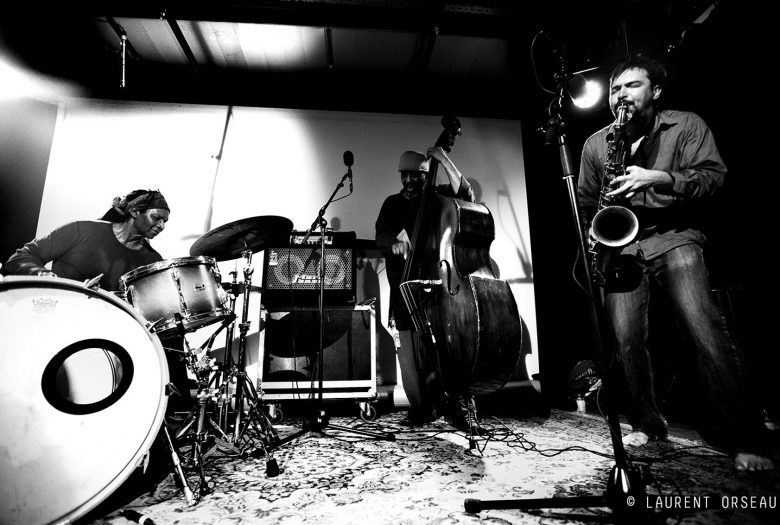William Parker is a master musician, improviser, and composer. He plays the bass, shakuhachi, double reeds, tuba, donso ngoni and gembri. He was born in 1952 in the Bronx, New York. He studied bass with Richard Davis, Art Davis, Milt Hinton, Wilber Ware, and Jimmy Garrison. He entered the music scene in 1971 playing at Studio We, Studio Rivbea, Hilly’s on The Bowery and The Baby Grand, playing with many musicians on the avant-garde school Bill Dixon, Sunny Murray, Charles Tyler, Billy Higgins, Charles Brackeem, Alan Silva, Frank Wright, Frank Lowe, Rashid Ali, Donald Ayler, Don Cherry, Cecil Taylor, Jimmy Lyons, Milford Graves and with traditionalists like Walter Bishop, Sr. and Maxine Sullivan. Early projects with dancer and choreographer Patricia Nicholson created a huge repertoire of composed music for multiple ensembles ranging from solo works to big band projects. Parker played in the Cecil Taylor unit from 1980 through 1991. He also developed a strong relationship with the European Improvised Music scene playing with musicians such as Peter Kowald, Peter Brotzmann, Han Bennink, Tony Oxley, Derek Bailey, Louis Sclavis, and Louis Moholo. He began recording in 1994 and leading his own bands on a regular basis founding two ensembles, In Order To Survive, and The Little Huey Creative Music Orchestra. In 2001, Parker released O’Neal’s Porch, which marked a turn toward a more universal sound working with drummer Hamid Drake. The Raining on the Moon Quintet followed, adding vocalist Leena Conquest and the Quartet from O’Neal’s Porch. Most notable among many recent projects is the Inside Songs of Curtis Mayfield. He has taught at Bennington College, NYU, The New England Conservatory of Music, Cal Arts, New School University and Rotterdam Conservatory of Music. He has also taught music workshops throughout the world including Paris, Berlin and Tokyo and the Lower East Side. Parker is also a theorist and author of several books including the Sound Journal, Document Humanum, Music and the Shadow People and The Mayor of Punkville.
By the close of the 1990s, Hamid Drake was widely regarded as one of the best percussionists in improvised music. Incorporating Afro-Cuban, Indian, and African percussion instruments and influence, in addition to using the standard trap set, Drake has collaborated extensively with top free jazz improvisers Peter Brotzmann, Fred Anderson, and Ken Vandermark, among others. Drake was born in Monroe, LA, in 1955, and later moved to Chicago with his family. He ended up taking drum lessons with Fred Anderson’s son, eventually taking over the son’s role as percussionist in Anderson’s group. As a result, Fred Anderson also introduced Drake to George Lewis and other AACM members. Drake also has performed world music; by the late ’70s, he was a member of Foday Muso Suso’s Mandingo Griot Society, and has played reggae. Drake has been a member of the Latin jazz band Night on Earth, the Georg Graewe Quartet, the DKV Trio, Peter Brotzmann’s Chicago Octet/Tentet, and Liof Munimula, the oldest free improvising ensemble in Chicago. Drake has also worked with trumpeter Don Cherry, Pharoah Sanders, Fred Anderson, Mahmoud Gania, bassist William Parker (in a large number of lineups), and has performed a solstice celebration with fellow Chicago percussionist Michael Zerang semiannually since 1991. Hamid Drake recorded material is best represented on Chicago’s Okkadisk label.
One of Europe’s finest free jazz trombonists, Conrad Bauer is one of those many unfortunate artists who have largely fallen through the cracks of public and critical consciousness. He’s no secret among musicians, however; his many collaborators include such leading avant-gardists as Louis Sclavis, Derek Bailey, Han Bennink, Anthony Braxton, Peter Brotzmann, Gerry Hemingway, Fred van Hove, Peter Kowald, George Lewis, Butch Morris, Tony Oxley, and Barre Phillips. Bauer spent his early career in East Germany, studying trombone in Dresden and Berlin. He spent the ’70s and ’80s leading his own bands in the GDR; he led the state jazz orchestra in 1987-1988. His profile rose in the ’90s as he began recording for Western labels. His solo appearance at the 1991 Victoriaville (Canada) Festival was recorded and issued on the Victo label. He’s since recorded several times under his own name and as a sideman for the Intakt and FMP labels, among others. His brother Johannes Bauer is also a prominent free jazz trombonist.

